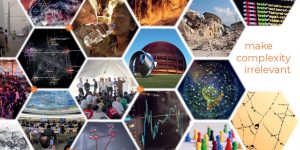January 4, 2021, by abrierley
Internship with GluoNNet
by Dominik Sitarek , Politics and Internal Relations student
At the start of June of 2020, I began a placement at a company called GluoNNet, broadly speaking I am a data science intern. It would not be an overstatement to say it has been life changing,  ithas opened doors I did not know existed. The initial role was for two months but has been extended to present day and hopefully post-graduation, I will therefore speak about the experience in present tense.
ithas opened doors I did not know existed. The initial role was for two months but has been extended to present day and hopefully post-graduation, I will therefore speak about the experience in present tense.
Due to the somewhat unorthodox nature of the company and Indeed the role, some background is first necessary. GluoNNet emerged out of the increasing demand for an interdisciplinary approach to solving some of the world’s hardest problems. The company span out of CERN (large particle collider in Switzerland), with whom it has a partnership alongside CernOpenLab, working with them on quantum computing.
One such aforementioned hard problem is adapting companies to Environmental, Social, and Governance standards (ESG). This is the area in which my role first dealt with. ESG is a set of criteria for a company’s operations much like financial information is. ESG provides standards for, amongst other things, what impact a company has on the environment and on the communities in which it works in. The issue is however, that there is no unified way in which companies report on these matters. I and another intern therefore had to trawl through hundreds of company reports and figure out any commonalities between them. We had to figure out what constituted a ‘good’ company report, we had to develop ways in which to interpret the various ESG metrics and how they map onto the real-world environment. Finally, we had to translate this into a synthetic database such that a diagnostic tool could be built from it.
As time progressed, I started to train on the more technical side of things, namely programming in Python. I had previously started a couple of start-ups and completed various online coding courses, but my skill ability is still that of a beginner. This is perhaps the most challenging yet most rewarding aspect of the placement, it is challenging because learning to code at an advanced level is hard enough in itself, there is a steep learning curve. To have to learn this with people who have PhD’s ranging in particle physics, quantum mechanics and, genomics has been one of the more humbling and surreal experiences of my life. At present I am learning how to analyse air traffic data to the end of being able to calculate how efficiently an airspace is being utilised. One of the highlights has been being invited to participate in 2021 World Economic Forum.
The application and interview process were relatively informal, I received the job position advertisement through the School of Politics placement manager Stephen Vaccarini, I had about two days to write a cover letter and send off a CV. There was a relatively unstructured phone interview with the CEO. It was clear that what they were looking for was someone who is very flexible and willing to work outside one’s comfort zone and had the ability to quickly grasp the nature of the work that was done at GluoNNet. Due to the incredibly diverse nature of the role, this is paramount. For example, one day I would be sitting in on a pitch to a large software development company, on another, I would be sitting in on a meeting with the head of a country’s aviation authority.

There are three pieces advice I can give to students who wish to work in any remotely tech related role (though the latter two can be somewhat generalised):
(1) Learn how to code as soon as possible, preferably in a language called Python, DataCamp is a great place to start online. Not because it’s the fashionable thing to do but because it opens up so many doors. This is especially true if one is a student of social sciences, there are relatively few people who can write well and deal with fuzzy topics and be technical at the same time. Coding and technical skills in general are high leverage and non-limiting. You can teach yourself almost any non-technical subject by reading, this is not so with coding or any other technical skill. This is not to say that one is harder than the other, they are just different. It is much more time consuming to learn a technical skill, and it becomes progressively harder with age. Not having such an ability may limit you if you decide to, for instance, switch careers down the line.
(2) Get an internship or work experience at a small company, and preferably a start-up. You will learn more in two weeks than you would in two months of working for a trans-national corporation. Due to the small team size, you have a huge amount of responsibility from day one, your absence and presence matters. In large companies, you seldom get to see the fruits of your labour, in small companies you have a tangible part to play in the company’s success if you so desire.
(3) Talk to your professors as much as possible. Forming professional relationships with your tutors and professors will provide you with an ample amount of opportunities not available to those who sleep-walk through university. Professors reward effort and engaging with the material; interacting with them outside of lectures and tutorials demonstrates to them not only that you understand the subject matter, but that you have the curiosity and drive necessary to achieve great things. They will vouch for you when the need arises, for instances when you need a reference or are looking for a job. Volunteer on course committees; ask about what type of research your professor is doing and inquire if you could work with them; do as many internships as possible; read outside your field: as you sow, so shall you reap.

No comments yet, fill out a comment to be the first

Leave a Reply